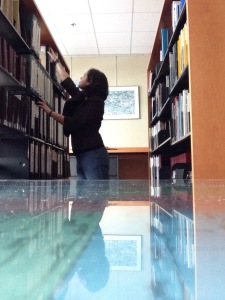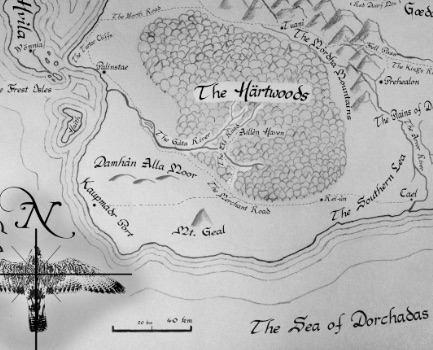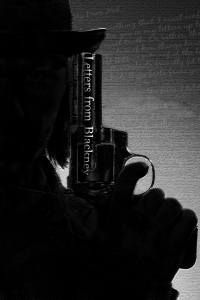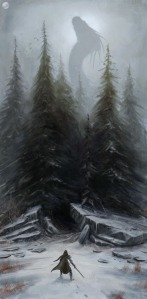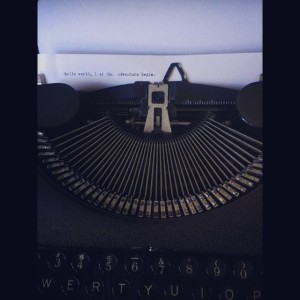
There’s this thing that I’ve noticed with artists of any sort: we are a very emotional bunch. This is not to say that we are always in despair, or that we are always prone to over dramatization; however, we feel things a little too much.
Artists understand that feeling emotion is part of what makes life so grand and so special. We realize that in order to best utilize our artistic talents, we must delve into the deepest, darkest parts of our souls and ferret out a description of what we find lurking there.
When we artists are happy, we are very happy, but when we are sad, we feel that we are in the depths of despair (and we might just phrase it that way, because that is how our minds work). Sometimes people get frustrated at our glumness, startled and/or embarrassed by our outbreaks of joy, or slightly terrified by our anger.
Now, I feel I must interject that I do not believe that we need to be (or should be) controlled by our emotions. No, as Christians we must discipline our minds and our bodies to make our emotions submit to not only our better judgments, but also to God’s laws. This may seem impossible, but with the freedom gained through a relationship with Christ, and by the indwelling of the Holy Spirit, I assure you that it is completely possible.
That being said, emotions are not in themselves evil, and, within the constraints of what is Godly, true, good, and beautiful, they must be cherished as a wonderful gift.
Tears can be beautiful, as they remind us to be compassionate, to share empathy, to cherish precious moments… and they awaken us to injustice and inspire us to take action.
Righteous anger can be beautiful, as it stands up for the weak and the helpless, fights tirelessly against the Devil, and reflects the righteous cause of Christ.
Joy that is so full that you can’t stop smiling is beautiful, as it spreads love and happiness wherever it goes, and brings peace and the light of Christ into situations that are dim with hopelessness.
I think that artists, creatives, and the visionaries of the world feel these emotions–and many more–most of all (or at least are aware of them more than most). We don’t try to hide our feelings, but explore them, experiment with them, and describe them so that we will not forget; so that later, when we are searching for inspiration, we might look back and remember how it felt to be lonely, how it felt to be giddy with joy, or how it felt to be scared of the dark.
I have long loved poetry for the very reason that it is a form of writing that is particularly well suited to depicting emotions. However, I can’t just sit down and write a bunch of poems on the spot: I have to be feeling something even more deeply than normal in order for me to be able to express a poem that I can read with satisfaction and without a lot of grimacing and shaking of my head.
Over the past few years, God has been doing a lot of work inside of me, and this process has been particularly conducive to writing poetry. Sometimes, when my heart is just too full of all of the emotions, and I can’t find anyway to vocally express how I feel, I turn to poetry. These poems become my prayers. Although most of them aren’t worded in a typical prayer format, they are my heart poured out upon paper and offered as a sacrifice, a question, and/or a plea before the throne of God. Sometimes they are straight forward, but most of the time poetry lends itself best to the metaphorical and/or the fanciful (providing me all the more reason to love poetry).
Sometimes the words that come are dark, filled with fear, grief, and questions:
The Broken Heart
“Let the wind fall,
Let the waves crush
The stones beneath their icy grip.
“May the storm come,
May the clouds seethe
And hide the changing hills from light.”
The maiden’s hands,
Raised to the sky,
Salt tears painted her pale cheeks.
Red lips pursed,
Brown eyes moistened,
The outward effects of a broken heart.
The wind did fall,
The waves did crush
The stones beneath their icy grip.
The storms did come,
The clouds seethed
And hid the changing hills from light.
But none did mend
The rent ’twas made
By the thoughtless acts of a callow man.
Other times my poems are filled with longing and passion:
What’s Your Name, My Love?
What’s your name, my Love?
Dare I touch your face,
Hold your hand,
For fear you are only another dream?
Where do you live, my Love?
Can I give my number,
Ask you to call
On some summer’s evening with coffee for two?
God only knows how I can miss someone I have never met.
Hold me close, my Love.
I dream of this time.
There you are;
We will meet and be together always.
Look in my eyes, my Love!
See how I long for you,
Only for you,
To love and to cherish from this day forward.
God only knows how I can miss someone I have never met.
At still other times, I write as a battle cry or as a reminder to myself of what I know to be true:
Light a Candle
When you dream the world is darker than it should be,
Light a candle.
When you hear the whispers of night calling,
Don’t be afraid.
For the dark will fade in the daylight,
And the dawn will bring a new day.
And when the morning has risen,
The monsters in the shadows will run away.
So there you have it: a brief glimpse into my own personal, poetic, prayerful emotional turmoil. 🙂 I hope you enjoyed.

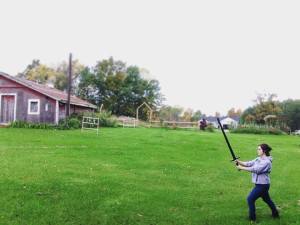
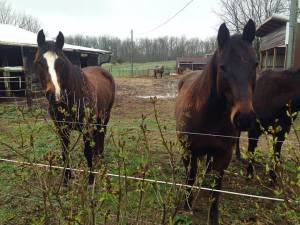 ice longsword or my practice one-handed arming sword. I’m sure the neighbors think I’m nuts (their horses definitely do), but it’s great exercise, a good self-defense skill
ice longsword or my practice one-handed arming sword. I’m sure the neighbors think I’m nuts (their horses definitely do), but it’s great exercise, a good self-defense skill